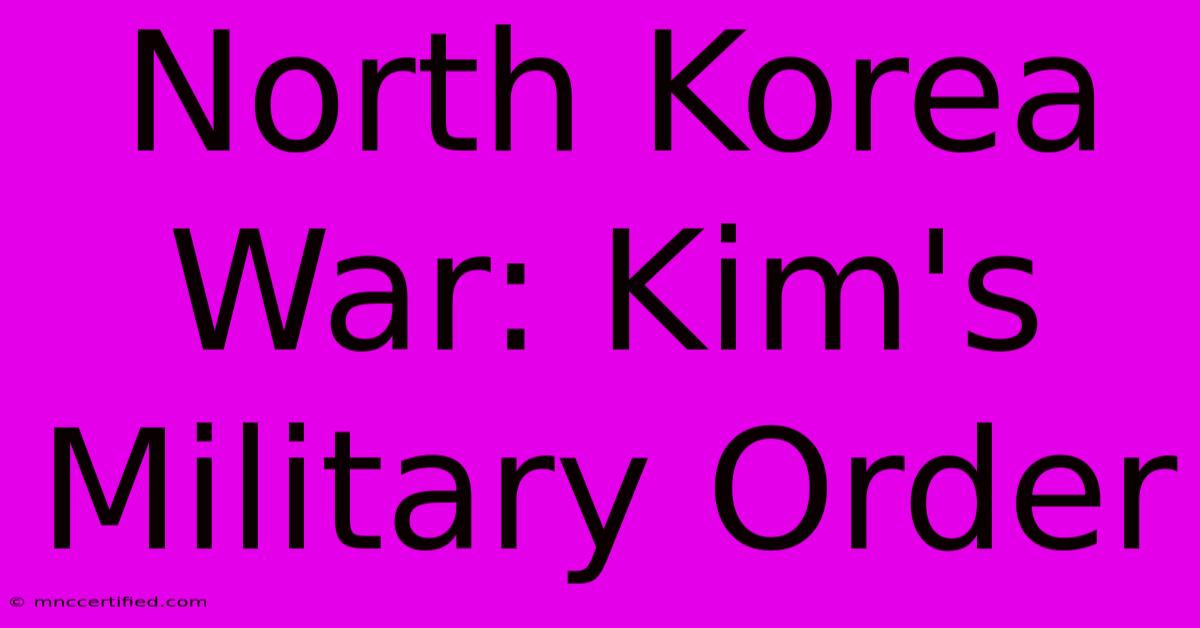North Korea War: Kim's Military Order

Table of Contents
North Korea War: Understanding Kim's Military Orders and Their Global Implications
The recent military orders issued by North Korean Supreme Leader Kim Jong Un have sent ripples of concern throughout the international community. Understanding the context, implications, and potential ramifications of these orders is crucial for navigating the complex geopolitical landscape of the Korean Peninsula and beyond. This article delves into the specifics of these orders, their potential motivations, and their impact on regional and global stability.
Decoding Kim Jong Un's Military Directives: A Closer Look
Kim Jong Un's military orders are rarely straightforward. They often involve a complex interplay of domestic political maneuvering, economic considerations, and strategic calculations regarding regional and global powers. Recent pronouncements have focused on several key areas:
Increased Military Readiness and Exercises:
Kim's emphasis on heightened military readiness, including increased drills and mobilizations, points to a potential escalation of tensions. These activities, often showcased through state-controlled media, serve multiple purposes. They project strength both domestically, bolstering Kim's authority, and internationally, sending a message to adversaries. Analyzing the scale and nature of these exercises is crucial to assess the immediate threat level. Are these routine maneuvers, or do they signal a preparation for more significant action?
Development and Testing of Advanced Weaponry:
North Korea's ongoing development and testing of ballistic missiles and nuclear weapons are a major source of international concern. Kim's directives in this area are designed to advance the country's military capabilities, potentially deterring foreign intervention and reinforcing its negotiating position. The advancements in missile technology and nuclear capabilities pose a significant security challenge, necessitating a careful assessment of their implications for regional stability and global non-proliferation efforts.
Strengthening Border Defenses:
The strengthening of border defenses, particularly along the Demilitarized Zone (DMZ), highlights North Korea's focus on maintaining control and deterring potential incursions. This aspect often goes hand-in-hand with increased military exercises and emphasizes the importance of monitoring North Korea's border security measures for any indication of offensive or defensive posturing. The DMZ remains a volatile area, and any significant changes in its security posture warrant close attention.
The Motivations Behind Kim's Military Orders: A Multifaceted Analysis
Understanding the motivations behind Kim's military directives requires analyzing various factors:
- Domestic Political Consolidation: Showcasing military strength reinforces Kim's authority and legitimacy within North Korea, particularly in the face of economic challenges and potential internal dissent.
- International Pressure and Sanctions: Kim's military actions may be a response to international sanctions and pressure aimed at curbing North Korea's nuclear and ballistic missile programs.
- Regional Geopolitics: North Korea's actions are influenced by the dynamics of regional power plays, including its relationship with China, South Korea, and the United States.
- Economic Considerations: Military spending, despite its economic burden, is seen by the regime as a necessary investment in national security and international standing.
The Global Implications: A Call for International Cooperation
Kim Jong Un's military orders carry significant global implications. The potential for miscalculation and escalation remains high, necessitating a measured and coordinated international response. Open communication channels, diplomatic efforts, and a commitment to de-escalation are crucial to preventing conflict. This also involves strengthening international cooperation to enforce existing sanctions and explore avenues for peaceful resolution.
The situation on the Korean Peninsula remains fluid and requires continuous monitoring. Experts from various fields – military strategists, political analysts, and intelligence agencies – are continuously analyzing the information available to assess the situation's trajectory and the potential impact on global security. Staying informed about the latest developments and engaging in informed discussions is paramount in navigating this complex and potentially volatile geopolitical landscape.

Thank you for visiting our website wich cover about North Korea War: Kim's Military Order. We hope the information provided has been useful to you. Feel free to contact us if you have any questions or need further assistance. See you next time and dont miss to bookmark.
Featured Posts
-
Kelce Swift Face Bills Fans Ire
Nov 19, 2024
-
Massive Mineral Deposit Found Near Japan
Nov 19, 2024
-
Cowboys House Roof Debris Incident
Nov 19, 2024
-
Indias Air Pollution 2024 Ranking
Nov 19, 2024
-
Pakistan Vs Australia T20 Stoinis Match Highlights
Nov 19, 2024